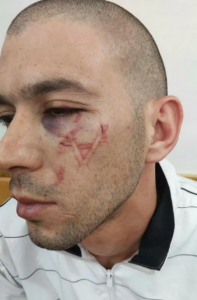4 border policemen indicted – star of David stamped on Palestinian’s face, evidence destroyed

The wounds on Arawa Shikh Ali’s face, August 2024
Nir Hasson reports in Haaretz on 1 January 2025:
The Justice Ministry’s police investigations unit on Tuesday filed an indictment against four border police officers for assaulting Arawa Shikh Ali, a 22-year-old resident of the Shuafat refugee camp in Jerusalem, and for destroying evidence.
The incident, which occurred in August 2023, became public after Shikh Ali was brought into court with serious injuries to his face, including one in the form of a Star of David.
The indictment filed with the Jerusalem Magistrates Court alleges that during a search for drugs and weapons in Shikh Ali’s home, police found a substance suspected of being cannabis. When the suspect refused to cooperate, he was tied up in front of his wife and children and treated violently.
Later they tied a garbage bag over his eyes and brought him to a room further inside the house where, while his hands were cuffed behind his back, one officer kicked him hard in the face, causing him to begin bleeding. Later they punched, slapped and kicked him and tied him up in a position known as the “banana,” in which his hands and feet were handcuffed together behind his back.
The indictment asserted that there was no need or justification or need for such acts. In addition, the indictment cites curses and insulting remarks made to Shikh Ali, including one officer who told him “to shut up, or I’ll rip off your ear.”
Three of the officers were also indicted for destroying evidence. That included intentionally deleting the GoPro videos that documented the incident, as well as photos they took on their cell phones, to prevent them from being used as evidence.
After being arrested on suspicion of possessing drugs, Shikh Ali was brought to court where Judge Amir Shaked extended his remand. Citing “the severe injuries, to put it mildly, on the suspect’s body,” the judge also ordered a transcript of the hearing be forwarded to the department for investigating police misconduct.
Several days later, another Jerusalem Magistrates Court judge, Adi Bar-Tal, rejected the police’s request to extend the remand and ordered Shikh Ali to house arrest. The judge criticized the police’s conduct, which, despite a court order, did not bring the suspect for a medical examination. In addition, the police kept him at the police station for four days, instead of transferring him to a detention facility.
After his release, Shikh Ali filed a complaint with the police investigations unit, alleging that during his arrest he had been seriously injured by the police and much of the time handcuffed and blindfolded, even though he was not suspected of security offenses.
He asserted that 20 police officers witnessed the incident, five of whom assaulted him and helped handcuff his arms and legs. “What didn’t they do to me? Look at what they did – to my body, too,” he said. “In front of my children. I’m not lying – my wife also saw it. In front of my two children.”
Last May, internal investigations notified seven police officers from the Jerusalem District that they would be ordered to stand trial contingent on a hearing. On Tuesday, the indictment was filed against four of them. The police officers are accused of aggravated assault, causing serious bodily harm and in some cases destruction of evidence.
The internal investigations unit said it viewed the incident very seriously. “A bound and helpless person was violently attacked by police officers charged with maintaining public safety. These acts deeply damage the public’s trust in the law enforcement system,” it said.
When the incident first surfaced in the public last year, police claimed that officers used “reasonable force” at the time of the arrest and that the injury was likely caused when Shikh Ali’s face pressed against one of the officers’ shoes. They claimed that what appeared to be a Star of David was the pattern created by the laces and buckles on the shoe.
In addition, the police called the news reports on the arrest “tendentious and distorted.” In its version of events in the incident, “During a search warrant conducted at the suspect’s home in the Shuafat refugee camp, substances suspected of being drugs were seized in quantities too large for personal consumption.
“At a certain point, the suspect began to run amok, violently attacked the police officers and resisted their arrest, requiring several police officers to complete the arrest, which was carried out legally. Due to his violent resistance, the police officers were forced to use reasonable force as they are authorized to until the arrest was completed.”
This article is reproduced in its entirety
T
